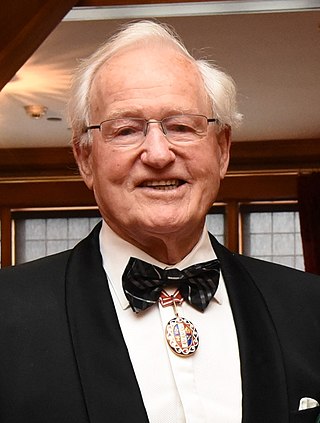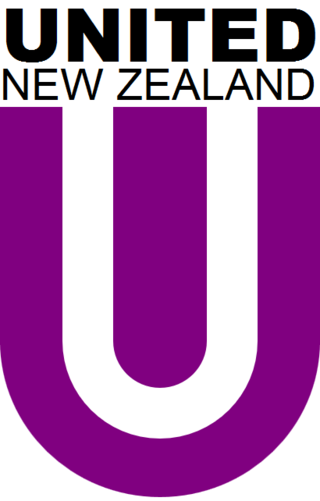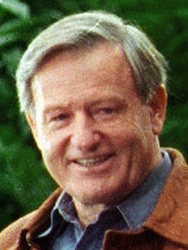
The politics of New Zealand function within a framework of an independent, unitary, parliamentary democracy. The system of government is based on the Westminster system, and the legal system is modelled on the common law of England. New Zealand is a constitutional monarchy in which King Charles III is the sovereign and head of state, while his prime minister serves as the head of government.
The New Zealand National Party, shortened to National or the Nats, is a centre-right New Zealand political party that is the current ruling party. It is one of two major parties that dominate contemporary New Zealand politics, alongside its traditional rival, the Labour Party.
New Zealand First, commonly abbreviated to NZ First or NZF, is a political party in New Zealand, founded and led by Winston Peters, who has served three times as deputy prime minister. The party has formed coalition governments with both major political parties in New Zealand: with the New Zealand National Party from 1996 to 1998 and 2023 to present, and with the New Zealand Labour Party from 2005 to 2008 and 2017 to 2020. New Zealand First currently serves in a coalition government with both National and ACT New Zealand as part of the Sixth National government, having won 6.08% of the total party vote in the 2023 New Zealand general election.

Ruthanasia, a portmanteau of "Ruth" and "euthanasia", is the pejorative name given to the period of free-market policies conducted during the first term of the fourth National government in New Zealand, from 1990 to 1993. As the first period of reform from 1984 to 1990 was known as Rogernomics after the Labour Party Minister of Finance, Roger Douglas, so the second period became known as "Ruthanasia", after the National Party's Minister of Finance, Ruth Richardson.

James Brendan Bolger, affectionately called The Great Helmsman, is a New Zealand retired politician of the National Party who was the 35th prime minister of New Zealand, serving from 1990 to 1997.

Ruth Margaret Richardson is a retired New Zealand politician of the National Party who served as Minister of Finance from 1990 to 1993. Her 1991 budget, which she dubbed the "Mother of all Budgets", formed the catalyst for her party's economic reforms known in the media as "Ruthanasia".

The 1987 New Zealand general election was a nationwide vote to determine the shape of the 42nd sitting of the New Zealand Parliament. The governing New Zealand Labour Party, led by Prime Minister David Lange, was re-elected for a second term, although the Opposition National Party made gains. The election also saw the elimination of the Democratic Party from Parliament, leaving Labour and National as the only parties represented.

Richard William Prebble is a former member of the New Zealand Parliament. Initially a member of the Labour Party, he joined the newly formed ACT New Zealand party under Roger Douglas in 1996, becoming its leader from 1996 to 2004.

United New Zealand was a centrist political party in New Zealand founded in 1995. It merged with the Christian-based Future New Zealand party to form the United Future New Zealand party in 2000.

The 1996 New Zealand general election was held on 12 October 1996 to determine the composition of the 45th New Zealand Parliament. It was notable for being the first election to be held under the new mixed-member proportional (MMP) electoral system, and produced a parliament considerably more diverse than previous elections. Under the new MMP system, 65 members were elected in single-member districts by first-past-the-post voting, while a further 55 "top-up" members were allocated from closed lists to achieve a proportional distribution based on each party's share of the nationwide party vote.

The McGillicuddy Serious Party (McGSP) was a satirical political party or joke party in New Zealand in the late 20th century. Between 1984 and 1999, it provided "colour" to ensure that citizens not take the political process too seriously. The party's logo, the head of a medieval court jester, indicated the intention to critique current systems by poking fun at them.

The 1993 New Zealand general election was held on 6 November 1993 to determine the composition of the 44th New Zealand Parliament. Voters elected 99 members to the House of Representatives, up from 97 members at the 1990 election. The election was held concurrently with an electoral reform referendum to replace the first-past-the-post system, with all members elected from single-member electorates, with mixed-member proportional representation. It saw the governing National Party, led by Jim Bolger, win a second term in office, despite a major swing away from National in both seats and votes, and the carrying of the referendum by 53.9% to 46.1%.
Alan Ross Meurant is a New Zealand public figure, now Honorary Consul for Morocco, who has at various times gained public attention as a police officer, businessman, politician, and political lobbyist.
Trevor Vicemar Rogers is a former New Zealand member of parliament, sitting for the National Party from 1990 to 1995, then for the Right of Centre party from 1995 to 1996.

The 45th New Zealand Parliament was a term of the Parliament of New Zealand. Its composition was determined by the 1996 election, and it sat until the 1999 election.

The 44th New Zealand Parliament was a term of the Parliament of New Zealand. Its composition was determined by the 1993 elections, and it sat until the 1996 elections.

The New Zealand electoral system has been mixed-member proportional (MMP) since the 1996 election. MMP was introduced following a referendum in 1993. It replaced the first-past-the-post (FPP) system New Zealand had previously used for most of its history. Under MMP, New Zealanders have two secret ballot votes to elect members of Parliament (MPs). The first vote is for a candidate from an electorate, a geographic electoral district. The second is the party vote for the political party the voter wants to form the government.
The Fourth National Government of New Zealand was the government of New Zealand from 2 November 1990 to 27 November 1999. Following electoral reforms in the 1996 election, Jim Bolger formed a coalition with New Zealand First. Following Bolger's resignation, the government was led by Jenny Shipley, the country's first female prime minister, for the final two years.
In parliamentary politics, balance of power is a situation in which one or more members of a parliamentary or similar chamber can by their uncommitted vote enable a party to attain and remain in minority government. The term may also be applied to the members who hold that position. The members holding the balance of power may guarantee their support for a government by either joining it in a coalition government or by an assurance that they will vote against any motion of no confidence in the government or will abstain in such a vote. In return for such a commitment, such members may demand legislative or policy commitments from the party they are to support. A person or party may also hold a balance of power in a chamber without any commitment to government, in which case both the government and opposition groupings may on occasion need to negotiate for that person's or party's support.

The 1999 New Zealand MP reduction referendum was held during the 1999 general election on 27 November 1999. The Referendum considered two questions, in which one brought upon the question on whether New Zealand Parliament should be restructured - reducing the number of MPs from 120 to 99 members in the House of Representatives.













